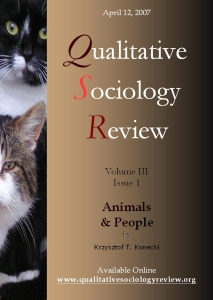‘Never an It’: Intersubjectivity and the creation of animal personhood in animal shelters
DOI:
https://doi.org/10.18778/1733-8077.3.1.05Keywords:
Animals, Human-animal interaction, Intersubjectivity, Personhood, PersonalityAbstract
This paper argues that sociology should begin to turn its attention to human-animal interaction and that one particularly effective way to do so is to adopt a phenomenological approach. This approach sees the personality, and thus the personhood of animals, as intersubjectively and reflexively created. Based on ethnographic data collected over three years in animal sanctuaries this paper assesses how animal sanctuary workers labour collectively to establish the identity of the animals under their care and how this, in turn, justifies their attitudes towards, and treatment of, them.
Downloads
References
Alger, Janet and Stephen Alger (1997) “Beyond Mead: Symbolic interaction between humans and felines.” Society and Animals 5(1):65-81.
Google Scholar
DOI: https://doi.org/10.1163/156853097X00222
Alger, Janet and Stephen Alger (2003) Cat Culture: The Social World of a Cat Shelter. Philadelphia: Temple University Press.
Google Scholar
Arluke, Arnold (1991) “Coping With Euthanasia: A Case Study of Shelter Culture.” Journal of American Veterinary Medical Association 198 (7):1176-1180.
Google Scholar
Arluke, Arnold (2003) “Ethnozoology and the Future of Sociology.” International Journal of Sociology and Social Policy 23(3):26-45.
Google Scholar
DOI: https://doi.org/10.1108/01443330310790246
Beck, Alan and Aaron Katcher (1996) Between Pets and People: The Importance of Animal Companionship. Indiana: Purdue University Press.
Google Scholar
Berger, Peter (1963) Invitation to Sociology: A Humanistic Perspective. New York: Anchor.
Google Scholar
Bogdan, Robert and Steven Taylor (1989) “Relationships with Severely Disable People: The Social Construction of Humanness.” Social Problems 36:135-148.
Google Scholar
DOI: https://doi.org/10.2307/800804
Cahill, Spencer (1998) “Toward a Sociology of the Person.” Sociological Theory 16(2):131-148.
Google Scholar
DOI: https://doi.org/10.1111/0735-2751.00047
Cahill, Spencer (1998) “Toward a Sociology of the Person.” Sociological Theory 16(2):131-148.
Google Scholar
DOI: https://doi.org/10.1111/0735-2751.00047
Coulter, Jeff (1989) Mind in Action. Cambridge: Polity Press.
Google Scholar
Drew, Paul and Anthony Wootton (1988) “Introduction.” Pp. 1-13 in Erving Goffman: Exploring the Interaction Order, edited by P. Drew and A. Wootton. Cambridge: Polity Press.
Google Scholar
Francis, David (2005) “Using Wittgenstein to Respecify Constructivism.” Human Studies 28:251-290.
Google Scholar
DOI: https://doi.org/10.1007/s10746-005-7423-9
Garfinkel, Harold (1967) Studies in Ethnomethodology. Englewood Cliffs, N.J.: Prentice-Hall.
Google Scholar
Goffman, Erving (1961) Encounters. Bobbs-Merrill: New York.
Google Scholar
Goffman, Erving (1963) Behaviour in Public Places: Notes on the Social Organisation of Gatherings. New York: Free Press.
Google Scholar
Goffman, Erving (1967) Interaction Ritual. Garden City, NY: Doubleday.
Google Scholar
Hickrod, Lucy and R. Schmitt (1982) “A Naturalistic Study of Interaction and Frame: The Pet as ‘Family Member.’’ Urban Life 11(1):55-77.
Google Scholar
DOI: https://doi.org/10.1177/089124168201100103
Kaye, Kenneth. (1982) The Mental and Social Life of Babies. Chicago: University of Chicago Press.
Google Scholar
Kellert, Stephen (1980) “American Attitudes Toward and Knowledge of Animals: An Update.” International Journal for the Study of Animal Problems 1:87-119.
Google Scholar
Margolin, Leslie (1994) Goodness personified: The Emergence of Gifted Children. New York: Aldine de Gruyter.
Google Scholar
Murphy, Raymond (1995) “Sociology as if Nature did not Matter: An Ecological Critique.” British Journal of Sociology 46(4):688-707.
Google Scholar
DOI: https://doi.org/10.2307/591578
Myers, Olin (2003) “No longer the lonely species. A Post Mead Perspective on Animals and Sociology.” International Journal of Sociology and Social Policy 23(3):46–68.
Google Scholar
DOI: https://doi.org/10.1108/01443330310790255
Philips, Mary (1994) “Proper Names and the Social Construction of Biography: The Negative Case of Laboratory Animals.” Qualitative Sociology 17(2):119-142.
Google Scholar
DOI: https://doi.org/10.1007/BF02393497
Sanders, Clinton (1993) “Understanding Dogs: Caretakers’ Attributions of Mindedness in Canine-Human Relationships.” Journal of Contemporary Ethnography 22(2):205-226.
Google Scholar
DOI: https://doi.org/10.1177/089124193022002003
Sanders, Clinton (1995) “Killing with Kindness: Veterinary Euthanasia and the Social Construction of Personhood.” Sociological Forum 10(2):195-214.
Google Scholar
DOI: https://doi.org/10.1007/BF02095958
Sanders, Clinton (2003) “Actions Speak Louder than Words: Close Relationships between Humans and Nonhuman Animals.” Symbolic Interaction 26(3):405-426.
Google Scholar
DOI: https://doi.org/10.1525/si.2003.26.3.405
Schutz, Alfred (1967) Phenomenology of the Social World. Evanston: Northwestern University Press.
Google Scholar
Spiegel, Marjorie (1996) The Dreaded Comparison: Human and Animal Slavery. New York: Mirror Books.
Google Scholar
Taylor, Nicola (2004) “‘In it for the Animals: Moral Certainty and Animal Welfare.” Society & Animals 12(4):317-339.
Google Scholar
DOI: https://doi.org/10.1163/1568530043068047
Taylor, Nicola (2007, forthcoming) “Human-Animal Studies: A Challenge to Social Boundaries?” Proteus: Journal of Ideas.
Google Scholar
Taylor, Nicola and Tania Signal (2006) “Attitudes to animals: Demographics within a community sample.” Society & Animals 14(1):147-157.
Google Scholar
DOI: https://doi.org/10.1163/156853006776778743
Robins, Douglas, Clinton Sanders and Spencer Cahill (1991) “Dogs and Their People: Pet-Facilitated Interaction in a Public Setting.” Journal of Contemporary Ethnography 20(1):3-25.
Google Scholar
DOI: https://doi.org/10.1177/089124191020001001
Weider, D. Lawrence (1980) “Behaviouralistic Operationalism and the Life-World: Chimpanzees and Chimpanzee Researchers in Face to Face Interaction.” Sociological Inquiry 50(3/4):75-103.
Google Scholar
DOI: https://doi.org/10.1111/j.1475-682X.1980.tb00017.x
Wilkie, Rhoda (2005) “Sentient Commodities and Productive Paradoxes: The Ambiguous Nature of Human-Livestock Relations in Northeast Scotland.” Journal of Rural Studies 21:213-230.
Google Scholar
DOI: https://doi.org/10.1016/j.jrurstud.2004.10.002
Downloads
Published
How to Cite
Issue
Section
License

This work is licensed under a Creative Commons Attribution-NonCommercial-NoDerivatives 4.0 International License.











